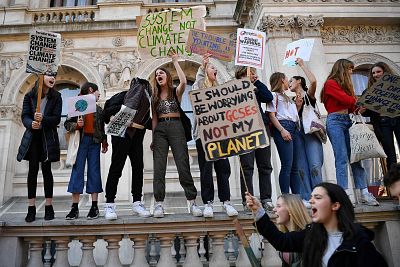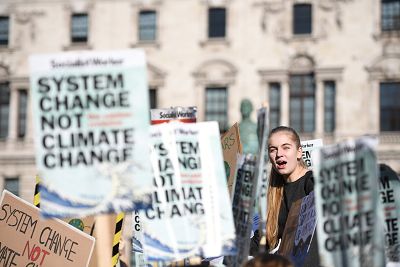"We feel that actually 2025, 2040, is not a million miles away," said 15-year-old George Bond, a U.K. student who took part in the Fridays For Future school strike.
LONDON — The year 2100 may be inconceivable to today's lawmakers, but for children it's a date within their lifetimes that is fueling anger and anxiety.
Thousands of children chanting "Save our planet!" descended on Parliament Square in London Friday as part of a school strike movement that has swept across Europe in recent months to demand action on climate change.
Demonstrators, many in their school uniforms, skipped class and are refusing to take exams, hoping to gain the attention of political leaders.
"Young people have so much passion and energy and so much enthusiasm for issues like this," said Tallulah Guard, 17, a London student participating in the march. "And considering it's our future, I think we need to be listened to."
A special report by the Intergovernmental Panel on Climate Change last year warned that emissions must drop 45 percent below 2010 levels by 2030 in order to avoid devastating consequences for the planet by the end of the century.
"We feel that actually 2025, 2040, is not a million miles away," said George Bond, 15, a student from the south coast town of Seaton who traveled to London for Friday's strike. "(We) have the largest stake in this issue."
The walk-outs called Youth Strike 4 Climate and Fridays for Future were founded by 16-year-old Greta Thunberg, who began protesting outside the Swedish parliament last fall. Thunberg went on to address the United Nations climate talks in December, declaring, "Our political leaders have failed us."
"Why should I be studying for a future that soon may be no more, when no one is doing anything to save that future?" she had said.
While it's unclear whether her efforts are changing the minds of policymakers, they have grabbed the attention of her peers.
Thousands of students took to the streets of The Hague, the Netherlands, last week while large events have also gained traction over the last several months in Belgium, France and as far afield as Australia.
"I think that we've reached a tipping point," Thunberg told NBC News in a telephone interview from her home in Sweden. "People will rise to the challenge and realize the emergency of the situation and they will do something about it.
The breadth of support for the movement came as a surprise, Thunberg said. Youth Strike 4 Climate estimated young people from nearly 60 communities across Britain took part in Friday's event. In London the demonstration brought traffic to a halt.
The students — many with the support of parents and even some teachers who also joined the march — said they wanted to get the message across that just because they're too young to vote doesn't mean they shouldn't be heard.
"Learning is important but this is even more important," said Orla De Wardener, 10, amid the growing crowd.
Organizers are planning to build on the momentum of Friday's strike to collaborate on a global walk-out on March 15 involving students from nearly 20 countries.
"This is definitely the beginning," Bond said. "I think this is the start of a new era of student engagement in climate activism."
Experts on political movements say the uprising reflects both fears of climate change and anger about the lack of control young people have over decisions that affect their futures.
"It's a sign of their frustration that our generation, adults that do have the vote or are involved in politics and policy. We need to start listening to what young people are saying," said John Barry, a professor specializing in green political theory at Queen's University Belfast.
It is a misconception that young people are not interested in politics, Barry said. But conversations young people are having on social media or in protests seldom reach the ears of decision makers.
"There is very little public attention paid to those who are under 18," said Emily Rainsford, a research associate specializing in youth political participation at Newcastle University.
Adults or parents are responsible for protecting youth and representing their best interests, but the issue of the environment is turning that norm on its head, Rainsford said.
"There is a real intergenerational unfairness at the center of this issue," she said.
It's rare for demonstrations to result in policy changes, said Rainsford, but it can change attitudes.
Historically, Barry pointed to the U.S. civil rights and anti-Vietnam war protests "where non-violent direct action got a lot of work done in terms of tipping the political system into taking these issues seriously."
London's protest remained largely peaceful, with some teens playing music and younger students sitting in the grass on the sidelines to eat lunch.
One group staged a blockade of traffic, sitting in the street in front of buses and cars while they chanted profanities aimed at British Prime Minister Theresa May.
A spokesperson for May said that while the government welcomed the students' engagement, the disruption to schools and lessons would be difficult for teachers.
Her energy minister Claire Perry however said she was "incredibly proud" of the young people while opposition Labour Party leader Jeremy Corbyn expressed his support for the "school kids of today whose futures are most on the line".
While the environment was the focus of the demonstration, many young people said it isn't the only issue they're worried about.
With Britain's departure from the European Union looming and young people in many countries struggling to find good jobs in the modern labor market, organizers behind the protests are looking to the future with concern.
"Students have been excluded from conversations on the economy and public spending... These are things sorted by adults and it's so crucial that young people have a voice," Bond said.













